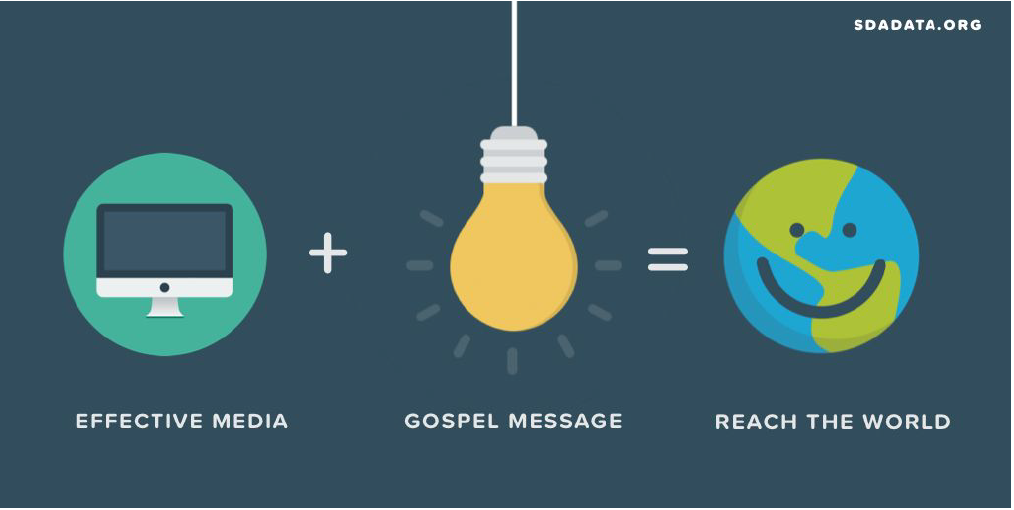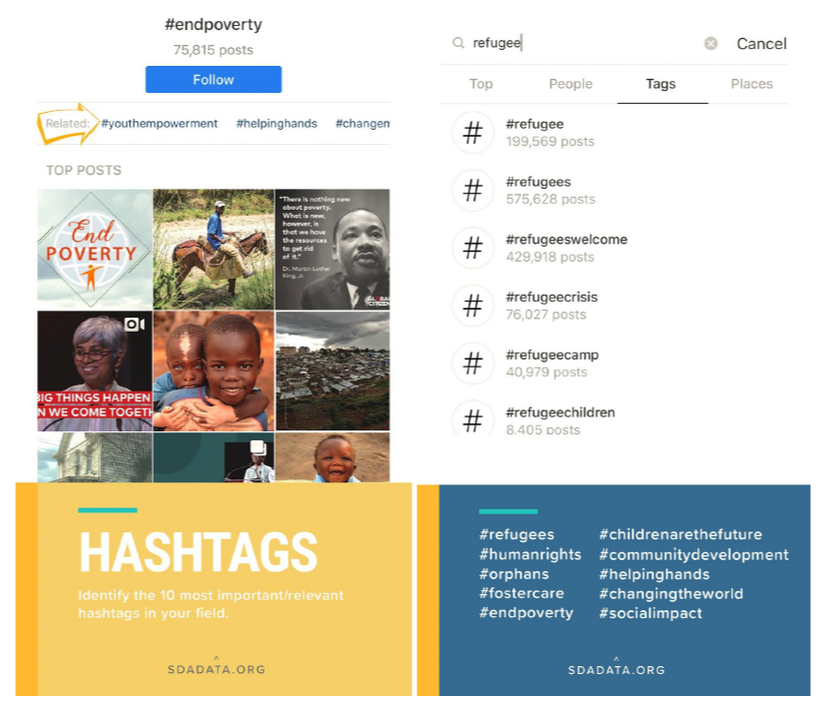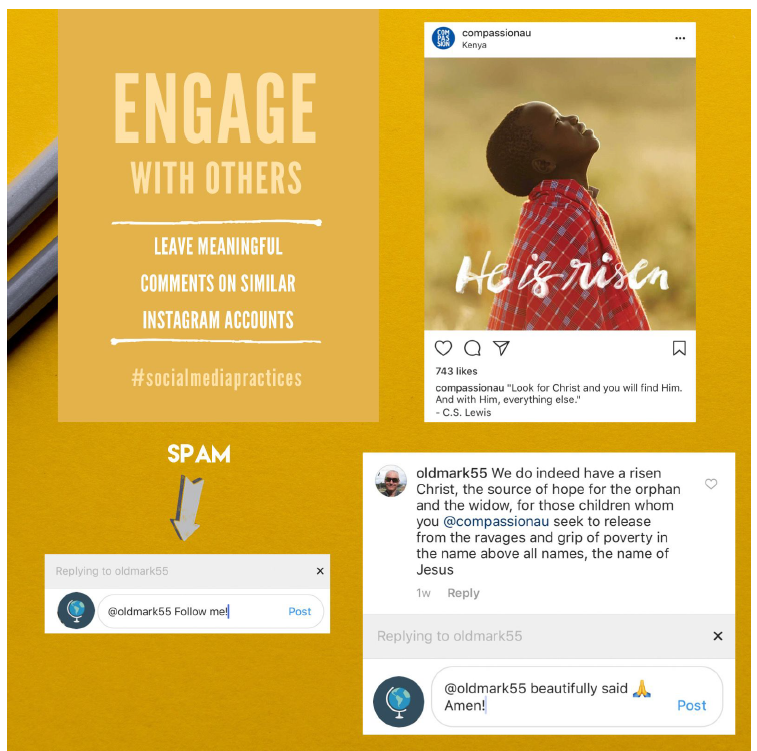David MwansaMarketing specialist and founder of @PraisePix, an Instagram ministry with over 23K followers. INTRODUCTIONA lot of ministries and churches worldwide are now beginning to understand the impact and reach of connecting with people online. If you have adopted this macro mindset, this is one of the most practical pieces of content to help your ministry post effectively on Instagram and grow your following. It’s important to understand that each social media platform is different. Whether you are just beginning on Instagram and looking for ways to be more active, or if you have already built a following and would like to see it grow, this information will bring you value. We will begin with two basic rules and then go into detail about specific step by step tactics every ministry should be doing. RULE #1Figure out your goal. One of the biggest questions that you will have to ask yourself and the members of your ministry is: what are we trying to accomplish and who are we trying to reach? Maybe you are a local church simply wanting to update your members and surrounding community on upcoming events or programs. Or maybe you are a youth and young adults ministry hoping to reach more teens and millennials online. The reason why this is so important is because many times when speaking with churches or ministries looking to get more active on social media, their immediate response to this question is “we want to reach everyone.” There is absolutely nothing wrong with that answer (in fact it’s amazing!), however it is much more effective to become a part of an online community when you have specified what that community is. RULE #2Build a community. This is the most important and critical aspect that many accounts overlook on Instagram. There is a difference between building a community and having a following. This is the reason why you will find pages on Instagram that have thousands of followers and only receive a small amount of likes and comments per post. On the reverse, that’s also why you can find accounts with 700 followers which have very high engagement. Whether you have 500 followers or 5,000 followers, it is so important to interact with your community. The truth is, the best way to grow on social media is to be to social. Reply to comments, say thank you, say hello and ask people where they are from etc. People will feel a deeper connection to your ministry and it’s message when your account feels less like a brand, and more like meaningful human interaction. When someone follows your page, they are voluntarily giving you their attention. Be mindful and considerate of the great gift of their time. Content: Before we get into the specific practices to help any ministry expand their reach on Instagram, your content will play a major role in how people interact with your posts. If you can post everyday, the better. Here are some tips on what kind of content you can easily put together in a matter of minutes if you run out of pictures or videos from your events to post, or if you’re not sure what to post consistently. Unsplash is an amazing resource of stock images available to download and use for any creative or commercial project for free. Once you find an image, add any quotes or Bible verses relating to your ministry with a wide variety of apps available on the Apple and Google App stores which allow you to add text on photos at no cost. Now you have content to post. Then what? Hashtags: Step #1 is finding the best Hashtags to follow and post on Instagram. For this article, we will be using the examples of ministries focused on Ending Poverty and Refugees. Spend about 30 seconds scrolling through the top 9 posts of each hashtag suggested by Instagram and engage with the community you aspire to become a part of. If your goal is to reach more people on Instagram who will value and engage with your content, take some time out everyday (10-20 minutes) to actively post and interact. Whether this is liking an image, asking questions, replying to comments or sending direct messages, every action counts. I always try to remember that there are real people behind the phone screens and computers who are being affected by our online activity. Instagram Stories. Instagram stories and live videos are a powerful way to reach your followers. If your ministry has a separate website, blog, or link that leads to a more in depth article, long length video, or landing page that you would like your followers to visit, Instagram stories are a great way to let people know what you have going on. Make sure to include text letting your followers know to click on the link in your bio. If you have a larger following, Instagram will give you the option to connect a link to your story. That way you can inform your followers to “swipe up” and it will lead them directly to the link you attached to the story. See example below: Instagram Live. Instagram live is a great way for ministries to engage and connect in real time with their followers. It’s a great way to allow the followers who couldn’t make it to some of the events you’ve hosted to stay updated with what’s going on, and still feel a part of the community. It’s also a great tool to simply say hello to the people who took the time to open your live stream. Instagram launched a collaborative live tool which allows two people to go live at one time from different locations. This gives a new opportunity to have conversations that matter and answer questions that people have in your community and give them a word of encouragement. We hope this post answered some of your questions about Instagram! Keep up the good work Digital Evangelists! Whatever you do, work at it with all of your heart; as working for the LORD, not for men: Colossians 3:23 Jamie Schneider DommDigital Strategist for the North American Division. Fulfilling Your Role in the Great CommissionWith the recent spotlight on Mark Zuckerberg and Facebook, many users are now wondering how to respond to the revelation that the social media giant not only mishandled access to user data, but also actively suppresses expression of Christian and conservative values, playing political “favorites” throughout the world. Given that Facebook, who also owns Instagram and WhatsApp, has almost no social media competitors, it’s easy to understand why most people feel upset. Facebook is the largest country in the world with over 2 billion active monthly users. WhatsApp boasts over 1.5 billion monthly users, and Instagram has over 600 million monthly active users. That is an impressive share of the digital market, and a misuse of the data and/or power wielded by these platforms constitutes a formidable threat to a free society. However, this reach is the very reason why Christians who are serious about fulfilling their role in the Great Commission should not hesitate to stay on these platforms. Social media has become part of the very fabric of our society. We can connect instantly with friends and family from around the world, share our ideas, and embrace what it means to be human. Humans, by nature, tell stories, desire connection, and share experiences and ideas. Social media platforms have saturated our lives because it speaks to these basic human needs. That need is never going away this side of Heaven. Advancements in technology are often continually driven by this need to better communicate and connect. Think about the history of communication technology: cave drawings, smoke signals, boats, domestication of horses, letters, the printing press, the railroad system, telegraphs, phones, cars, radio, planes, TV, internet, social media, and whatever comes next. With each of these advancements in technology has also come the advancement of the gospel. For example, the Gutenberg printing press brought about mass production of the Bible and religious literature, allowing the gospel message and reformation ideas to spread throughout Europe. I believe that the next Great Awakening will be a digital one. If we unite in purpose to spread the Gospel online, we can proclaim the three angels’ message with a loud voice throughout the world. During the apostolic period, the gospel was spread by dedicated teachers and evangelists who often faced ridicule, persecution, and sometimes death. They took the gospel where the people were, regardless of the personal cost. Today we are often hindered by fears of what people might think of us, or who might be offended if we share our beliefs online for all to see. In the Western world, we do not face persecution for our religious beliefs in the same way other Christians do around the world. In the case of social media, our posts may be removed or reach restricted, and, in some cases, expressing our religious convictions could threaten our employment. These are some less severe consequences we face as members of Western society, but it is enough to stop many of us from engaging at all. We may not be spiritually ready to stand in the fires or be persecuted like the young men in Daniel 2, but at the moment, God isn’t asking us to. He has, however, asked us to use what is in our hands (Exodus 4:2) to connect with the children of God and share the gospel. With 20 million members worldwide, we as a church body could work together as content creators, engagers, and distributors to generate a mighty voice for sharing the gospel message. Social media is the modern School of Tyrannus, a place where the ancient Ephesians gathered to engage with new ideas, pass the time, share thoughts, and participate in discussions. Paul spoke at the School of Tyrannus in Greece for two years after being kicked out of the synagogue (Acts 19:8-9), essentially getting the gospel to go viral in his day. (Dee Casper, Brand Evangelist, ARTV) This took place for two years, so that all who lived in Asia heard the word of the Lord, both Jews and Greeks: Acts 19:10. Young people spend up to nine hours a day engaging with social media; they go there to fill time, share with friends, and see new things. Like Paul, we must take the gospel where they are and engage them in discussion where they spend their time. We must make use of this technology before it’s too late. We don’t know for certain what the “Time of Trouble” will bring upon us, but I’m sure censorship will be a dominating factor that will lead to persecution. I have dealt with censorship issues repeatedly while working for the North American Division. It has often shocked me and frustrated my efforts to promote life-changing medical services, healthy living principles, spiritual messages, and services for those struggling with addiction. It has been a grave concern of mine since taking this position after my time at the Smithsonian and realizing the dramatic differences in treatment of the content and campaigns I’m now tasked with running. This has only made me more committed than ever before to utilize these technologies to accomplish our mission. After all, if we are doing the Lord’s work, the Holy Spirit will grant us favor when the algorithms won’t. While our department adapts and readjusts to make social media successfully work for our mission, our goals would be better served by fair and equal treatment on the platforms. To be clear, Facebook does not give advertisers access to an individuals’ data, but it allows advertisers to run highly targeted ads, maximizing impact while reducing costs. I’m hopeful that these recent events will ultimately result in making Facebook, as well as other giants like YouTube and Twitter, a safe place for free speech, religious expression, and the exchange of all ideas. Religious organizations will stand to benefit from the removal of discriminatory biases that limit reach and access to advertisement of our ideas and resources. Furthermore, I think it is essential that everybody take the time to watch the entire stream of the Facebook legal proceedings and avoid basing opinions on a few strategically edited compilation clips that are not reflective of the whole committee proceeding. We should be careful to not let the various stakeholders exploit our busy schedules and consequent short attention spans to shape our understanding of the issues. The outcome of these legal inquiries will undoubtedly shape the future. These proceedings are ultimately about every individual’s constitutional right to free speech, religious expression, and privacy of personal information. Please invest the time to watch and understand the implications of Facebook’s breaches of trust. This is hopefully the first of many conversations around this topic. We must pay attention and hold these companies accountable, otherwise they maintain monopolies with the power to decide who has a voice, who has your data, and what they do with this information. Not only is this problematic in a free society, but also problematic to our mission as Seventh-day Adventists. As Christians we must continue to advocate for free speech. Our ability to spread the gospel in the public forum relies upon it. Regardless of what ultimately comes out of these recent events, we must press forward, and speak Bible truths with this powerful technology. Stay, but stay with purpose. Share your faith online. We cannot wait any longer. This is our generation’s great commission. But the eleven disciples proceeded to Galilee, to the mountain which Jesus had designated. When they saw Him, they worshiped Him; but some were doubtful. And Jesus came up and spoke to them, saying, “All authority has been given to Me in heaven and on earth. Go therefore and make disciples of all the nations, baptizing them in the name of the Father and the Son and the Holy Spirit, teaching them to observe all that I commanded you; and lo, I am with you always, even to the end of the age”: Matthew 28:16-20. |
Archives
August 2020
Categories
All
|
- Home
- BLOG
-
RESOURCES
-
RESOURCE MENU
>
- ADVENTIST IDENTITY GUIDELINES
- BIG DATA RESOURCES
- BRANDING, IMAGE & DESIGN RESOURCES
- CHURCH/MINISTRY SPECIFIC RESOURCES
- COPYRIGHT & TRADEMARK BASICS
- COURSES
- EMAIL RESOURCES
- GUIDANCE FOR HIRING SOCIAL MEDIA POSITIONS
- PODCASTS
- REPORTS & CASE STUDIES
- SOCIAL MEDIA RESOURCES
- (SOCIAL) VIDEO RESOURCES >
- TEXTING 4 CHURCHES
- TRACKING & ANALTYICS
- WATCH VIDEOS & TUTORIALS
- WEBSITE TIPS
- SOCIAL MEDIA GUIDELINES
-
RESOURCE MENU
>
- SEO
- Digital Discipleship & Evangelism
- COVID-19 RESOURCES
- eNEWSLETTER







 RSS Feed
RSS Feed